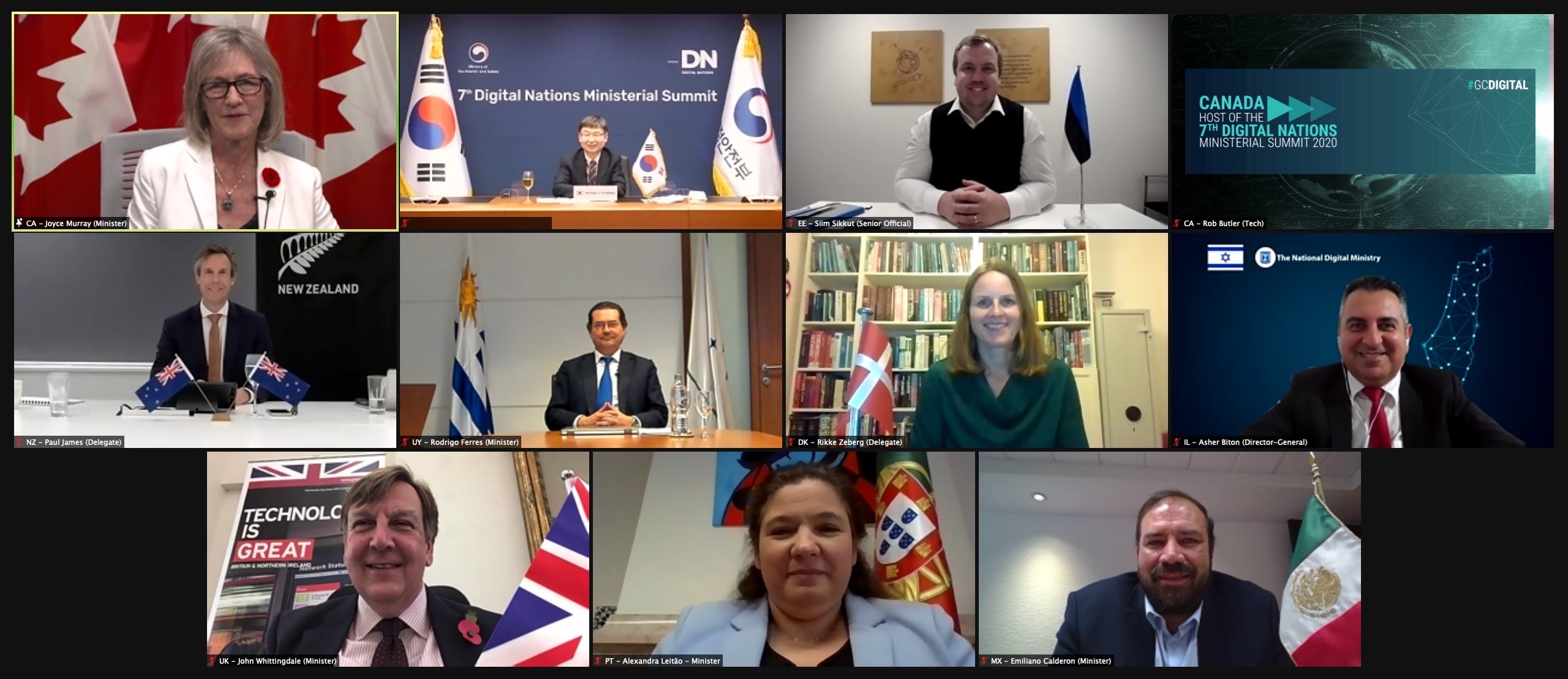
Last month, I had the privilege of chairing the 7th Annual Digital Nations Ministerial Summit. This forum of ten leading digital government countries is committed to using technology to improve the lives of their citizens and residents. Over three days of meetings and workshops – all done virtually, not surprisingly – I met with ministers, officials, and digital tech experts from Canada, Denmark, Estonia, Israel, Mexico, New Zealand, Portugal, South Korea, the United Kingdom, and Uruguay. We discussed common challenges, shared successes, and explored areas of further collaboration, all with the common goal of accelerating our digital government service transformations.
When Canada assumed the Chair of the Digital Nations at the Ministerial Summit in Uruguay back in 2019, I had been looking forward to welcoming the delegates to Ottawa in person this November. But like most of our plans for 2020, we had to pivot, adjust, and go fully digital.
If anything, the challenges we’ve faced over the past few months made the public service more adaptive, agile, and ready to leverage technology to serve people better! This was on display in our planning of the summit. In short order, Digital Government public servants delivered a shared virtual experience – including a generous helping of Canadian culture – for delegates from ten countries across eight different time zones. No small feat, congratulations!
This past year has been full of achievements like this one. Public servants in countries around the world are working across multidisciplinary teams to innovate and respond to unprecedented challenges. Here in Canada, the COVID Alert exposure notification app, the Canadian Emergency Response Benefit, and the COVID-19 Benefits Finder highlighted our government’s shift to making new services digitally accessible to Canadians quickly, and then they needed them most.
My goal is to harness this momentum to deliver more secure, reliable, and easier to use digital services for Canadians. While we have made strides over the past few years, there is much more we can do when it comes to user-friendly digital service. The Digital Nations Summit is one way to learn from other digital governments, and amid the ongoing challenges of a pandemic this collaboration is critical.
At last month’s Summit, we participated in candid discussions on issues like the ethical use of technology, the environmental impact of public sector’s IT operations, and attracting and upskilling digital talent. A common thread throughout all the meetings was, “Why build a service when you can borrow it?” This spirit of working together, and developing services in the open are key tenets of the updated Digital Nations Charter, signed by all ten countries during the summit – in a virtual ceremony, of course!
Denmark, Mexico, and Estonia are leading the charge in revamping legislation to enable better data-sharing across departments, which is a cornerstone for providing seamless services to citizens and something I was very interested in hearing about. In the area of digital literacy and inclusion, Israel has developed an open learning platform, providing free courses and training to members of the Israeli public. Use of this platform skyrocketed during the first stage of the pandemic – clearly showing that people found it useful and relevant. I’m also interested in partnering with New Zealand and Portugal, international leaders in digital identity, to learn how Canada can apply like-minded solutions across out federal structure.
Digital advancement is also an opportunity to address environmental impacts and challenges. I’m very proud of the work Canada has done to lead the Digital Nations working group on Greening Digital Government, and to make environmental sustainability a cornerstone of digital recovery efforts. Through this group, the ten countries of the Digital Nations will work to implement measurable, sustainable, and greener IT practices. This includes holding suppliers accountable for their climate footprint and actively promoting built-in environmental stewardship. In Canada, our Greening Government Strategy targets IT investments and energy-efficient cloud services to help reduce government operations emissions by 40% by 2030 and achieve net zero by 2050. I’m looking forward to leveraging the work of the Digital Nations to broaden our influence, and develop shared climate change mitigation strategies for the full value chain of tech procurement.
This is just a snapshot of the work we’ve done, and continue to do, with our Digital Nations partners. As this year’s chair, Canada also contributed to the forward planning of the Digital Nations. The United Kingdom will chair in 2021, followed by South Korea in 2022. I look forward to continuing the work of delivering better and greener digital services to citizens.
During the Charter signing ceremony, Paul James, Chief Digital Officer for New Zealand, quoted a Maori proverb that speaks to the shared work our countries are doing to better serve our citizens: “Nau te rourou, naku te rourou, ka ora te manuhiri.” This means “with your food basket, and my food basket, the people will thrive.” By developing open-source digital solutions and sharing our challenges and solutions, we can ensure our citizens and residents will thrive.




Add new comment